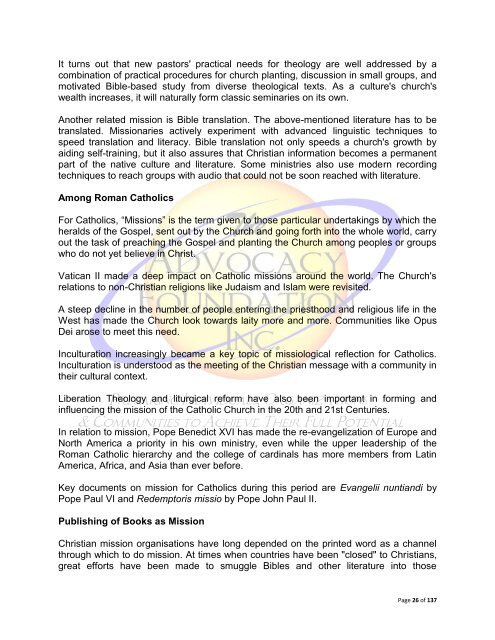The Theology of Missions
The Theology of Missions
The Theology of Missions
You also want an ePaper? Increase the reach of your titles
YUMPU automatically turns print PDFs into web optimized ePapers that Google loves.
It turns out that new pastors' practical needs for theology are well addressed by a<br />
combination <strong>of</strong> practical procedures for church planting, discussion in small groups, and<br />
motivated Bible-based study from diverse theological texts. As a culture's church's<br />
wealth increases, it will naturally form classic seminaries on its own.<br />
Another related mission is Bible translation. <strong>The</strong> above-mentioned literature has to be<br />
translated. Missionaries actively experiment with advanced linguistic techniques to<br />
speed translation and literacy. Bible translation not only speeds a church's growth by<br />
aiding self-training, but it also assures that Christian information becomes a permanent<br />
part <strong>of</strong> the native culture and literature. Some ministries also use modern recording<br />
techniques to reach groups with audio that could not be soon reached with literature.<br />
Among Roman Catholics<br />
For Catholics, “<strong>Missions</strong>” is the term given to those particular undertakings by which the<br />
heralds <strong>of</strong> the Gospel, sent out by the Church and going forth into the whole world, carry<br />
out the task <strong>of</strong> preaching the Gospel and planting the Church among peoples or groups<br />
who do not yet believe in Christ.<br />
Vatican II made a deep impact on Catholic missions around the world. <strong>The</strong> Church's<br />
relations to non-Christian religions like Judaism and Islam were revisited.<br />
A steep decline in the number <strong>of</strong> people entering the priesthood and religious life in the<br />
West has made the Church look towards laity more and more. Communities like Opus<br />
Dei arose to meet this need.<br />
Inculturation increasingly became a key topic <strong>of</strong> missiological reflection for Catholics.<br />
Inculturation is understood as the meeting <strong>of</strong> the Christian message with a community in<br />
their cultural context.<br />
Liberation <strong>The</strong>ology and liturgical reform have also been important in forming and<br />
influencing the mission <strong>of</strong> the Catholic Church in the 20th and 21st Centuries.<br />
In relation to mission, Pope Benedict XVI has made the re-evangelization <strong>of</strong> Europe and<br />
North America a priority in his own ministry, even while the upper leadership <strong>of</strong> the<br />
Roman Catholic hierarchy and the college <strong>of</strong> cardinals has more members from Latin<br />
America, Africa, and Asia than ever before.<br />
Key documents on mission for Catholics during this period are Evangelii nuntiandi by<br />
Pope Paul VI and Redemptoris missio by Pope John Paul II.<br />
Publishing <strong>of</strong> Books as Mission<br />
Christian mission organisations have long depended on the printed word as a channel<br />
through which to do mission. At times when countries have been "closed" to Christians,<br />
great efforts have been made to smuggle Bibles and other literature into those<br />
Page 26 <strong>of</strong> 137

















